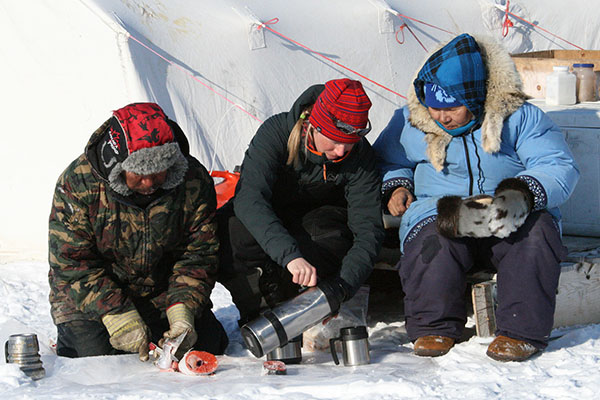High Arctic communities in Nunavut, Canada, and in Northwestern Greenland have long been familiar with narwhals. For centuries, the narwhal has been part of the Inuit diet, providing food and nourishment. Although the Arctic is home to many unique animals, it is the narwhal's long, protruding tusk that has inspired legends and stumped scientists for centuries. Scientists have partnered with various Arctic communities to understand the purpose of the narwhal’s tusk.
Geographic and environmental information from residents of two Indigenous Chukchi communities in the Republic of Sakha-Yakutia, Siberia, Russian Federation, practicing seasonal nomadic reindeer herding and other subsistence activities.
The purpose of The Northern Bering Sea: Our Way of Life is to show extensive areas where Alaska Native hunters and local fishermen harvest ocean resources, and the marine waters important to the resources we rely on. It illustrates that the whole northern Bering Sea is the storehouse that supports our way of life.
This data set contains observations of sea ice, weather, and wildlife collected by Indigenous Inupiaq and Yup'ik sea ice experts in several communities along the northern and western coasts of Alaska, beginning in 2006. This information is generously shared with the public by the observers and the communities within which the observers reside.
This atlas showcases Arctic communities actively involved in observing social and environmental change. It was designed to highlight the many community-based monitoring (CBM) and traditional knowledge (TK) initiatives across the circumpolar region.
December 2009
ELOKA and the Sustained Arctic Observing Networks (SAON) have begun collaborating on an inventory of Local and Traditional Knowledge (LTK) projects in the Arctic. This inventory will be used in the development of a map-based, searchable directory of Arctic LTK-related projects.

Matthew Druckenmiller is a research scientist at NSIDC focusing on the implications of climate and environmental change on Arctic coastal communities and marine mammals. His training and background span geophysics, engineering, geographical information science (GIS) science, and science-to-policy.
Noor Johnson is a research scientist at the National Snow and Ice Data Center (NSIDC) at the University of Colorado Boulder and the principal investigator (PI) for ELOKA. She is a cultural anthropologist whose research focuses on environmental knowledge production and governance in the Arctic. At ELOKA, Johnson’s work focuses on building tools and approaches to support community data management.

